

 Under the dark cloud of government shutdowns and other conservative-created mayhem shines a silver lining — the recent gains of California’s low-wage workers. Governor Jerry Brown has signed one law raising the state’s minimum wage and another that provides domestic housekeepers, maids and nannies with the right to get overtime pay. These were huge triumphs in a climate of constriction and budget cuts. Such policies will improve the lives of hundreds of thousands of workers, as well as their families and communities.
Under the dark cloud of government shutdowns and other conservative-created mayhem shines a silver lining — the recent gains of California’s low-wage workers. Governor Jerry Brown has signed one law raising the state’s minimum wage and another that provides domestic housekeepers, maids and nannies with the right to get overtime pay. These were huge triumphs in a climate of constriction and budget cuts. Such policies will improve the lives of hundreds of thousands of workers, as well as their families and communities.
These legislative victories are only as powerful as the organizing behind them. It was the huge numbers and commitment of thousands of organized workers (unionized or not) raising their voices that made it impossible for lawmakers to ignore their needs.
The exciting part of activating this new swath of workers is that many have historically not hailed from communities associated with trade unionism. Many come from low-income and/or immigrant communities of color.
» Read more about: California Love: Low-Wage Worker Activism »
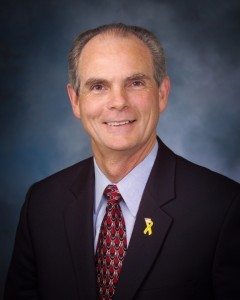

San Jose Mayor Chuck Reed made it official today – sort of. Speaking to a pension “restructuring” conference at Stanford University’s Hoover Institution, Reed said he hoped to file papers “in a few days” to put a ballot measure before voters that would allow cities in California to gut the retirement plans of their public employees. But he acknowledged that he and a group of fellow activists weren’t sure whether to put the measure on the ballot for November 2014 or sometime in 2016. (If the pension group wants to beat an approaching deadline and keep 2014 open as an option, it has to file papers soon.)
The lack of urgency contrasted with Reed’s half-hour talk, during which he painted a picture of a California teetering on the brink of pension-fund disaster, in which public safety employees would be laid off, libraries closed and retirement benefits decimated.
“Time is of the essence,” Reed warned – claiming that the longer his proposed amendment to the state constitution is postponed,
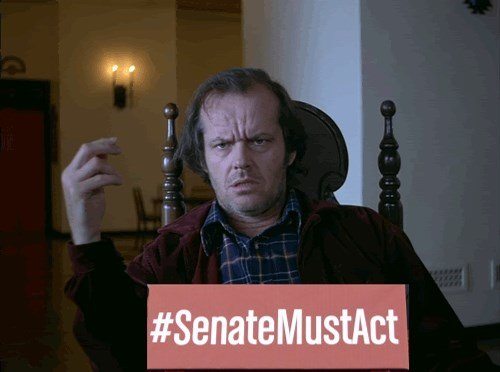

 “I would dispel the rumor that is going around that you hear on every newscast, that if we don’t raise the debt ceiling, we will default on our debt,” says Senator Tom Coburn (R-OK). “We won’t. We’ll continue to pay our interest.”
“I would dispel the rumor that is going around that you hear on every newscast, that if we don’t raise the debt ceiling, we will default on our debt,” says Senator Tom Coburn (R-OK). “We won’t. We’ll continue to pay our interest.”
This is crazy talk. While the Treasury Department could prioritize interest payments after October 17 – the day the Treasury Department says it no longer has legal authority to pay the nation’s debts – and not pay Social Security and Medicare, this would buy a few days at most.
Meanwhile, interest rates will soar, stock prices will plummet, the global economy will begin spiraling downward, and millions of Americans wouldn’t receive their Social Security and Medicare.
So why are Republicans talking like this? Because they want to sound as if they’re willing to blow up the economy if they don’t get their way.
» Read more about: Debt Ceiling Talk from Congress’s Crazy Corner »


 “Can Google Solve Death?” read the cover headline of a national news weekly. It cleverly enticed readers to read the story inside. The question also represents one of the major problems facing human beings. No, not death, but hubris.
“Can Google Solve Death?” read the cover headline of a national news weekly. It cleverly enticed readers to read the story inside. The question also represents one of the major problems facing human beings. No, not death, but hubris.
Hubris was one of the themes of the great Greek tragedies in the fifth century before the Common Era. The Greek playwrights like Aeschylus, Euripides and Sophocles understood all too well the capacity of humans to extend themselves beyond their ability to limit the damage caused by their actions.
So great families disintegrated, monarchs fell and society itself came close to collapse – all because people in power could not stop themselves from reaching beyond their limitations as human beings. We do the same, but in new ways with unknown consequences.
Global climate change comes instantly to mind. Last spring, for the first time in human history,
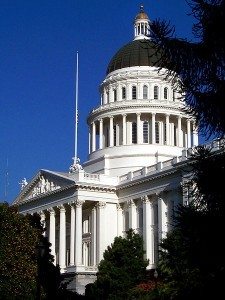

Across the nation, private companies are looking to take over public services. A legislative battle in Sacramento over a bill to privatize state trial courts epitomizes the promises and pitfalls of privatization.
Assembly Bill 566 (Wieckowski, D-Fremont) would require that before contracting services out, courts must provide proof of cost savings, create employment standards, engage in a competitive bidding process and undergo regular financial and performance audits. The bill now sits on the governor’s desk for signature or veto, and the lobbying on both sides is intense.
As in most debates over outsourcing of public services, its opponents’ central claim is that privatizing essential courtroom services such as court reporting, processing cases, probate investigations and interpretive services, saves dollars.
Yet the track record on privatization of public services and assets is decidedly mixed. Public agencies that hire private companies without strong mechanisms of accountability, transparency, rigorous evaluations of contracting costs and standards have learned this the hard way.
» Read more about: Private Control of Public Services Requires Extra Care »
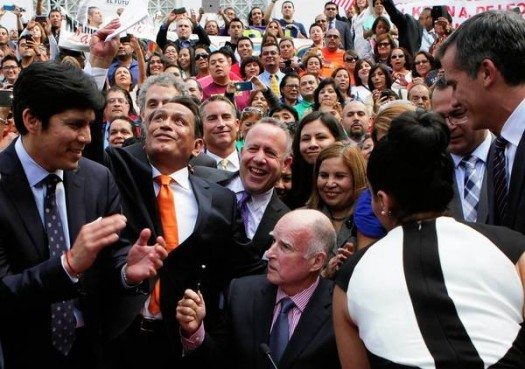

The caption under this front-page photo in Friday’s Los Angeles Times read: “Gov. Jerry Brown, center, is surrounded by cheering officials, from left, state Sen. Kevin de Leon, L.A City Councilman Gil Cedillo, Senate President Pro-Tem Darrell Steinberg and L.A. Mayor Eric Garcetti.”
Missing from that list is the smiling woman right behind Brown. That’s Angelica Salas, executive director of Coalition for Humane Immigrant Rights in Los Angeles (CHIRLA), a key leader of the immigrant rights movement in California and nationwide and a major force behind passage of the bill that Brown was signing. Salas is also missing from the news story that accompanied the photo. The article quoted politicians and law enforcement officials, but none of the activists whose years of work resulted in this new law as well as several other recent legislative victories, including a domestic workers bill of rights and an increase in the state minimum wage to $10 an hour.


The U.S. Supreme Court’s new term, which began yesterday, could spell a world of hurt for working Americans. People who believe this aren’t simply looking at worst-case scenarios — in which, say, the conservative majority sides on every point with plaintiffs represented by the National Right to Work Legal Defense Foundation. No, their view rests on the conservatives’ well-established penchant for producing rulings that go far beyond the original cases before the justices – rulings that make laws that didn’t previously exist, grant awards that weren’t sought and answer briefs that were never filed.
But equally as ominous as the handful of labor-related cases that will start pleadings in November is McCutcheon v. Federal Election Commission, which began arguments today.
It seems like only yesterday that the high court, in Citizens United v. Federal Election Commission, pried opened a portal to a spending orgy by lifting limits on how much corporations and unions could contribute to election campaigns.
» Read more about: McCutcheon v. FEC: “Citizens United” on Steroids »


For the past seven days America has watched a government shutdown unfold, courtesy of the Tea Party-controlled House of Representatives – a moment of political vaudeville more worthy of the description “circus” than “theater.” Beginning this week, however, we may be in for the start of a truly Grand Guignol event befitting the Halloween season.
That’s because the Supreme Court will hear several key labor cases this term, along with yet another plea from billionaires to be allowed to purchase a larger share of the electoral process. Just as the shutdown has battered the economy and harmed countless Americans through its curtailment of Headstart programs, the closing of federal parks and suspension of government health programs, so could damage be done to the national welfare by a handful of pro-business decisions by the high court. If the present conservative majority continues to vote within its ideological groove,


Louis T. Wigfall would have loved Ted Cruz.
Wigfall was another Lone Star State senator who viscerally hated a president of the other party.
The object of Wigfall’s deep disaffection was Abraham Lincoln, our first Republican president. Wigfall was a rabidly pro-slavery Democrat.
The GOP of “Lincoln and Liberty” is long gone. So is the Democratic Party of secession and slavery.
One could make a pretty fair argument that if Lincoln came back he’d be a Democrat, and Wigfall, a Republican.
Anyway, Wigfall was a leader of the “Fire-Eaters,” a group of fanatical Southern politicians who demonized and tried to delegitimized Lincoln and his anti-slavery “Black Republican” Party while whipping up secession sentiment in Dixie.
Lincoln was elected president in 1860 on a platform that called for stopping the spread of human bondage into the federal territories. White supremacists like Wigfall said Lincoln’s victory,
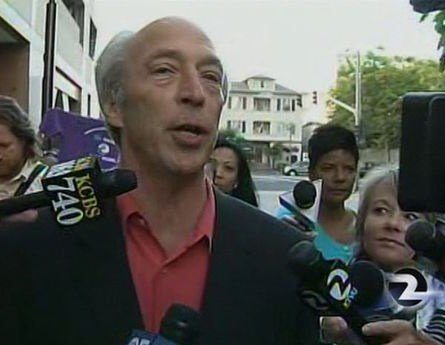

BART’s 60-day cooling off period is now heating up – but not in a good way.
When the Governor requested a 60-day cooling off period in Bay Area Rapid Transit negotiations in early August, there was a danger that this action would lessen pressure to reach an agreement. Unfortunately, this is exactly what has happened. In support of the cooling off period, BART management had told the Governor back in August that this would enable “us to continue negotiating…. The public should not be deprived of this essential public service unless all alternatives to avoid a work stoppage have been utilized.”
This sounds like common sense: Give the parties more time to avoid a crippling strike that surely no one on either side wants. But no sooner had the 60 days started than management reconsidered its position on utilizing “all alternatives” to avoid a strike. Instead of bargaining around the clock,
» Read more about: BART’s Top Negotiator Living High While Avoiding Talks »